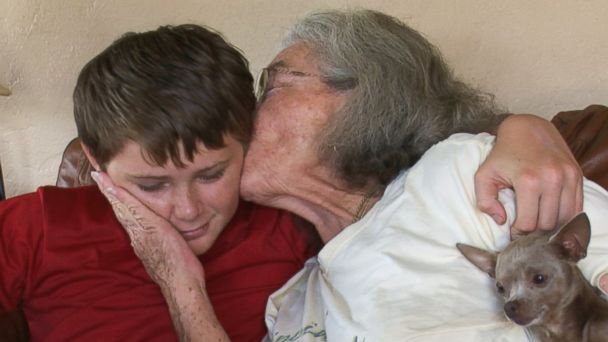Youth Caregivers: Students By Day, Nurses By Night
Chris Miller, 13, of West Palm Beach, Fla., is a free spirit always seeking the next thrill, but he also carries the weight of a responsibility that leaves him in constant fear.
Chris is the primary caregiver to his grandmother Dixie Miller, 63.
While his classmates are getting ready for school, Chris is busy getting his grandmother ready for the day. When the school day ends, he races home to care for Miller, whom he's lived with for the last 10 years.
For a list of resources for caregiving youth, see list at the end of the story.

Credit: ABC News
When Chris is not taking care of his grandmother, he's playing his prized violin. He learned the violin at school and plays in both music classes and concerts. Sometimes Miller can't make the concerts, but it makes her proud to see him having a passion.
"It helps me feel greater than I am. It just helps me feel like I'm not alone," said Chris.
Chris is just one of the estimated 1.4 million US children trying to keep up at school while being full-time caregivers at home, according to the National Alliance for Caregiving.
Chris' mother died when he was younger and his father has been in and out of prison.
Miller has extensive nerve damage and vision problems that require special medications, but she doesn't qualify for caregiving assistance under any government program.
Chris is her only option for help.
"A lot of people don't get it, and they just don't understand," he said.
Aereonna Defau, 14, knows what it's like to be a kid struggling under a mountain of adult worry and how quickly and cruelly life can change. Three years ago, her mother, Vicky Woodall, was diagnosed with stage 4 breast cancer.
"Once I found out, my life just turned upside down," Aereonna said. "I used to break down and cry every time I saw her in pain."
While Aereonna's stepfather works two jobs, Aereonna never strays from her mother's side. She used to love playing outside, but now she can only bear to be away for 30 minutes before checking on her mother. It's a delicate balancing act between a healthy child and an ailing parent.
"It hurts because I want Aeri to be a teenager," Woodall said. "I'm the one that's supposed to help her."
Connie Siskowski, the founder of the American Association of Caregiving Youth, said this burden can contribute to a feeling of isolation among young caregivers.
"They don't want to talk about what's going on at home," Siskowski said. "They're afraid and they feel isolated."
According to the Family Caregiving Alliance, 40 percent of family caregivers experience depression. For kids, schoolwork is often the first thing to suffer.
Chris said worrying about it all kept him up at night thinking about how his life was going to be without his grandma. He wonders how he will succeed.
"My life is still pretty good. It's hard, but it's good," said Chris.
For resources for all caregivers, check out the following organizations:
- American Association for Caregiving Youth
- Caregiving Youth Project
- National Alliance for Caregiving
- Family Caregiving Alliance
- The Caregiver Action Network
- Department of Veteran's Affairs
- Alzheimer's Foundation of American Teens
- Alzheimer's Association
- National Multiple Sclerosis Society
- Well Spouse
ABC News' Josh Elliott, James Wang and Jennifer Metz contributed to this story.